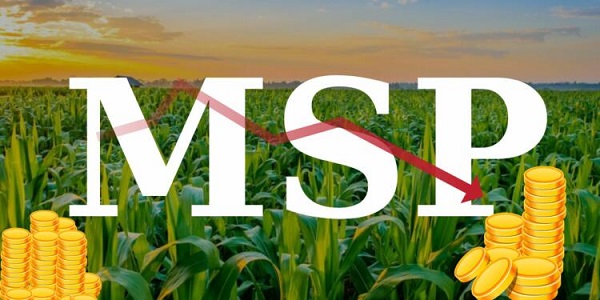GG News Bureau
New Delhi, 27th Feb. Significant unrest has recently occurred in Bharat’s agricultural sector, with Punjabi farmers spearheading the push for legislative changes. Three Union Ministers have put forth a visionary plan that would ensure the purchase of pulses, maize, and cotton crops at minimum support prices (MSP) for the next five years. This is a ground-breaking move that has the potential to drastically alter Bharat’s agricultural landscape.
The Minimum Support Price (MSP), a system intended to give farmers a guaranteed income for their produce, is at the center of their demands. MSP’s effectiveness and sustainability are currently being questioned, despite the fact that it has historically protected farmers by guaranteeing they are paid fairly. It is crucial to evaluate MSP’s place in contemporary agriculture and look into other avenues for sustainable farming methods and fair farmer income as the government struggles with calls for a legislative guarantee for MSP.
How did MSP change over time?
In an attempt to safeguard farmers from volatile markets and guarantee food security, MSP was introduced in Bharatiya agricultural industry. MSP has been instrumental in encouraging farmers to grow vital crops like wheat and rice over the years, which has helped the Green Revolution succeed. The over-reliance on crops that require a lot of water, distorted cropping patterns, and skyrocketing government grain stocks are some of the unintended consequences of relying on MSP.
Obstacles for MSP
The enduring worries farmers have about their ability to make ends meet are reflected in their demand for a legal guarantee for MSP. Nonetheless, this approach is not without its inherent difficulties and sceptics. Enforcing open-ended procurement at MSP for all crops may put a burden on the public purse, skew the dynamics of the market, and stifle agricultural innovation. Furthermore, MSP frequently surpasses market rates, making it impossible to force private vendors to comply and shifting the onus of procurement entirely onto the government.
Re-evaluating MSP
It is crucial to investigate substitute strategies in order to overcome the drawbacks of MSP and map out a course for sustainable farming. The Pradhan Mantri Kisan Samman Nidhi (PM-KISAN) scheme is one example of a direct income support mechanism that can be adopted. Governments can empower farmers to make market-driven decisions while protecting their livelihoods by directly assisting them financially.
Compared to MSP, direct income support has a number of benefits. It reduces bureaucratic inefficiencies and financial burdens by doing away with the requirement for intricate procurement and storage procedures. Additionally, it facilitates crop diversification and environmental sustainability by enabling farmers to alter their crop selections in response to market signals. The agricultural sector can be made more resilient and adaptable by governments if they reorient their focus from price supports to income supports.
Mode of Payment
The price-difference payment model, best illustrated by programs such as the Bhavantar Bharpai Yojana, is another novel strategy to supplement direct income support. In order to encourage farmers to sell their produce at market rates while maintaining income stability, this model compensates them for the difference between MSP and market prices. This model is a step toward market-oriented agricultural policies, despite its drawbacks and difficulties in implementation.
Prioritizing long-term sustainability and equity is critical as governments struggle with the complexity of reforming agricultural policies. In addition to providing income support, a comprehensive strategy for agricultural reform should also invest in market connections, infrastructure, and technology. It should also give smallholder farmers’ needs top priority because they are frequently disregarded by traditional agricultural policies.
To sum up, surrounding MSP in Bharat highlights the necessity of changing the way that agricultural policy is thought about. Even though MSP has been a vital instrument for guaranteeing food security and farmer welfare, its shortcomings are becoming more noticeable in light of changing agricultural underlying problems.


Comments are closed.